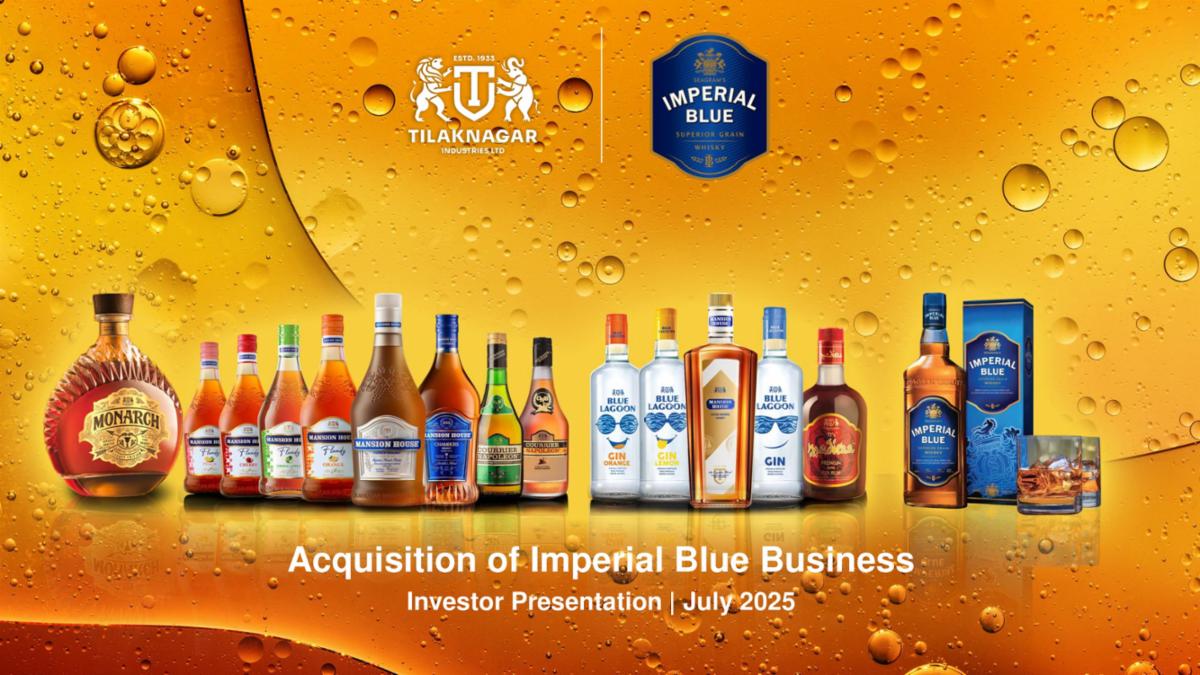Article Body
Tilaknagar Industries Completes Landmark Buyout of Imperial Blue from Pernod Ricard
India Sees Its Largest Ever Spirits Brand Acquisition
In a watershed moment for India’s spirits industry, Tilaknagar Industries Limited (TI) has signed definitive documents to acquire the iconic Imperial Blue whisky business division from French liquor giant Pernod Ricard India for an enterprise value of ₹4,150 crore. The sale, announced on July 23, 2025, marks the largest takeover of an Indian-made foreign liquor (IMFL) brand by a domestic company to date .
The Core Details: What the Deal Includes
-
Buyer: Tilaknagar Industries, makers of Mansion House, India’s largest brandy brand by volume.
-
Seller: Pernod Ricard India, local arm of the world’s second-largest spirits manufacturer (Wikipedia - Pernod Ricard).
-
Asset Sold: Imperial Blue, India’s third-largest whisky brand, with 22.4 million 9-litre cases sold in FY2025.
-
Deal Value: ₹4,150 crore (€412.6 million), including a deferred payment of €28 million (₹282 crore) payable in four years.
-
Mode of Acquisition: Slump sale for a lump sum amount, subject to standard closing adjustments.
-
Transaction Status: Awaiting approval from the Competition Commission of India; expected closure within six months.
Statements From Both Companies
Alexandre Ricard, Chairman and CEO of Pernod Ricard, said,
“This sale strengthens Pernod Ricard India’s portfolio, enabling us to fully tap into premiumization trends and support sustained, profitable growth. This realignment improves our ability to capitalize on India’s strong macroeconomic fundamentals and long-term potential” .
Amit Dahanukar, Chairman and MD of Tilaknagar Industries, added,
“Having achieved leadership in the brandy segment, it is now time for us to broaden our portfolio and cater to India’s diverse and evolving consumer base with this strategic acquisition. Imperial Blue is one of the country’s most trusted and admired brands” .
What Imperial Blue Represents
Imperial Blue was launched in 1997 by Seagram, later acquired by Pernod Ricard in 2002. It stands as India’s third-best-selling whisky, operating in the crucial “deluxe” market segment — bridging the gap between mass-market and premium whiskies . In FY2025, Imperial Blue reported revenues of ₹3,067 crore and sold 22.4 million 9-litre cases, holding 8.6% whisky market share in India .
Deal Structure & Funding
Tilaknagar Industries plans to fund the purchase through a mix of debt and equity, with plans to raise up to ₹6,500 crore in total — up to ₹2,500 crore in equity or equity-linked securities and the remainder through debt instruments . The deal involves two manufacturing units and contracts with bottling partners across India.
Market Reaction
Tilaknagar Industries’ stock price surged over 29% in the past month, peaking at ₹487.60 before settling near ₹454 on July 22, 2025. The acquisition buzz has driven record trading volumes and heightened analyst attention .
Why It Matters
-
Strategic Shift: The deal marks a decisive swing for Tilaknagar from brandy dominance toward the massive Indian whisky segment.
-
Industry Reordering: Pernod Ricard’s exit of the value whisky category follows a global premiumization drive, reallocating focus to high-growth brands like Chivas, Absolut, and Jameson .
-
Scale: Post-acquisition, Tilaknagar will have combined volumes of 34 million cases per year, ensuring a pan-India presence in both brandy and whisky.
The Road Ahead
Final regulatory clearance is pending. Upon closing, the deal is expected to be immediately accretive to Pernod Ricard’s Indian margins. Industry watchers say this sets a new precedent for homegrown firms acquiring top international brands.
“This transaction is a win-win for all stakeholders — and signals the growing clout of Indian players in global beverage markets,” said a Mumbai-based analyst.
For more details, refer to:

Comments